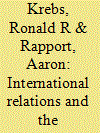| Srl | Item |
| 1 |
ID:
150038


|
|
|
|
|
| Summary/Abstract |
A growing area of research has addressed public perception of unconventional oil and natural gas development via hydraulic fracturing (“fracking”). We extend this research by examining how geographic proximity to such extraction interacts with political ideology to influence issue support. Regression analysis of data from a fall 2013 national telephone survey of United States residents reveals that as respondents’ geographic distance from areas experiencing significant development increases, political ideology becomes more strongly associated with issue support, with the liberal-partisan divide widening. Our findings support construal level theory's central premise: that people use more abstract considerations (like political ideology) the more geographically removed they are from an issue. We discuss implications for studying public opinion of energy development as well as for risk communication.
|
|
|
|
|
|
|
|
|
|
|
|
|
|
|
|
| 2 |
ID:
118159


|
|
|
|
|
| Publication |
2012.
|
| Summary/Abstract |
Theories of international relations have often incorporated assumptions about time horizons-a metaphor for how heavily actors value the future relative to the present. However, they have not built on a growing body of experimental research that studies how human beings actually make intertemporal tradeoffs. In this article, we present relevant findings from psychology and behavioral economics, notably those of "construal level theory" (CLT), and explore these findings' implications for three classic questions-international cooperation, preventive war, and coercion. We argue that experimental evidence regarding how people discount future value and construe future events challenges the conventional wisdom on international cooperation. We further maintain that CLT helps explain a longstanding puzzle about preventive wars-namely why they are often initiated too late by declining powers but too soon by rising competitors. Finally, we rely on these findings to explain who wins coercive contests and why compellence is often, but not always, harder than deterrence. Scholars of international relations often embed in their theories crucial assumptions about time horizons, and this article seeks to show what differences it makes if we ground these assumptions in what we know about actual human decision making.
|
|
|
|
|
|
|
|
|
|
|
|
|
|
|
|